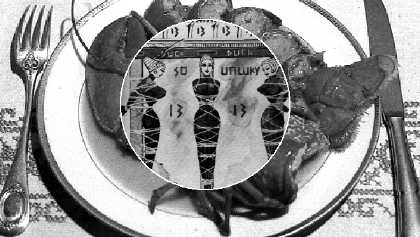Shop 'til You[r Connection] Drop[s]!
Shopping and Financing
Until quite recently, you didn't need to be a hardline feminist to testify to the mind-numbing boredom associated with the weekly supermarket shop. Now, however, things are changing: backed up by a plethora of TV shows and numerous restaurant spin-off recipe books dedicated to ever more exotic ingredients, food has become sexy. As a consequence, our shopping lists have become more adventurous and the supermarkets are proving quick to take advantage of our latest obsession.
 At the same time, technological developments are enabling us to satisfy our gastronomic desires digitally. The recent launch of several on-line supermarkets, most notably Tesco [www.tesco.co.uk], along with the re-invention of food shopping as a lifestyle activity, are raising questions about the cultural perception of shopping.
At the same time, technological developments are enabling us to satisfy our gastronomic desires digitally. The recent launch of several on-line supermarkets, most notably Tesco [www.tesco.co.uk], along with the re-invention of food shopping as a lifestyle activity, are raising questions about the cultural perception of shopping.
The rise of what is often called 'consumer society' has prompted numerous studies of shoppers' motivations and habits. The distinction between 'doing the shopping' and 'going shopping' has been key within these studies. 'Doing the shopping' is recognised as a predictable chore, an ordeal - as opposed to 'going shopping' which implies a leisure activity, a diversion from the more tiresome aspects of everyday life. Supermarket/grocery shopping falls very definitely into the former category.
Feminism has long been eager to undermine such distinctions. While 'doing' the shopping is identified (by men) as a 'female' activity, it is also a chore associated with the role of 'housewife'. In many ways the discussion revolves around the transition of shopping, as a 'gendered' activity, from chore to leisure pursuit and, consequently, to how the technologies that are playing a part in this might alter cultural perceptions.
Throughout contemporary gender and class studies it has been recognised that change is most successfully achieved through communication among social peers. In other words, some sense of a collective or fixed unitary position is needed before action can begin to effect change. As women have fought to establish this necessary community, the physical location of shopping facilities have provided a recognisable geography within which women can collectively communicate. Just as out-of-town superstores have fragmented these coherent spaces, online supermarkets might further undermine the physical communities formed by women as a part of everyday life.
Even so, with the eroticisation of shopping, and with the weekly amble around aisles filled with produce from exotic holiday destinations presenting an opportunity to daydream away an hour or so, the responsibility for 'doing the shopping' may be shifting.
There is no doubt that currently the digital domain, both at home and in the workplace, is predominantly male, and it seems likely that what may occur is a transferral of responsibility for the grocery shop from female to male preserve. While supermarkets have a captive market (everybody needs to eat) there is no doubt that their aggressive marketing techniques are encouraging us to purchase increasingly expensive goods whilst appearing to be about low prices and economy ranges. Being able to tap into an audience already intrigued by all things digital is an opportunity to seduce a new area of the market, namely men.
Although women might consider giving up responsibility for the weekly shop as winning a long fought battle there is also a sense that as grocery shopping becomes 'fun', a leisure activity as opposed to a chore, it also becomes a male activity. As on-line shopping is repositioned as a predominantly male activity its status also changes; 'doing the shopping' becomes 'going shopping'.
Anj MedhurstXanj AT sunbather.co.ukXSee Falk & Campbell (Eds.) The Shopping Experience (1997) Ch. 4, Supermarket Futures, for a more in-depth discussion of the distinction between 'doing' and 'going'.
Mute Books Orders
For Mute Books distribution contact Anagram Books
contact@anagrambooks.com
For online purchases visit anagrambooks.com







